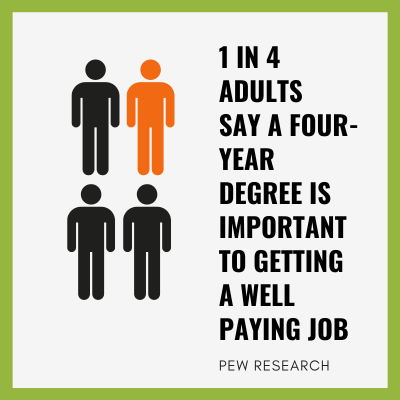You’ve probably heard that 2023 is the Lunar Year of the Rabbit, but did you know Europe has named 2023 the European Year of Skills?
According to Chinese Astrology, the rabbit symbolizes patience and luck, and will see a positive influence on people who are impulsive or unrealistic as they become more level-headed and practical.
We can’t think of anything more level-headed and practical than earning skills. So let’s celebrate with Europe and take a deeper look at their plans.
Numbers don’t lie.
The European plan is aggressive (in a positive way); here are the main stats they are working to improve or meet:
- 77% Of EU companies report difficulties in finding workers with the necessary skills
- 20 million Information and Communication Technology (ICT) specialists should be employed in the EU by 2030
- 60% of adults should participate in training every year by 2030
The plan breaks solutions into four categories including:
- Effective and inclusive investment in training and upskilling
- Ensuring skills are relevant to labor market needs
- Matching people’s aspirations and skill sets with opportunities
- Attracting skills and talent from other countries
This Rabbit is so level-headed and practical…I think I’m in love.
Improving Europe’s plan would be challenging, but we would offer one suggestion. Document what a student has learned, and earned and how it relates to employment. We call this Skills Transcript ™, and it’s automatically built into our platform from a student’s completed work. It complements a resume and provides employers with an additional level of confidence in fit, and hiring the right team.
Skills are no longer a dirty word.
One reason Jobspeaker is so optimistic about the future of skills is for one important reason – the market has fundamentally shifted, and learners are demanding skills. 75% of Gen Zers say college isn’t the only path to a good education and career. Hey HigherEd – if that stat from Forbes doesn’t make your blood chill, maybe you need reskilling.
Additionally, skill-based hiring is a growing trend. Several states, including Maryland, Utah, and Pennsylvania, to name a few, have abandoned degrees as a requirement for state jobs. Instead, they look at skills as criteria for hiring.
We certainly are not advocating that degrees are obsolete, far from it. Simply that there’s more than one path to education, and showing learners how any form of education maps to skills is critical to the future of education.
So, why is the U.S. playing catch-up to Europe?
Primarily because we won’t get out of our own way. Skill mapping to curriculum is hard work and too many times tied up in “committee.” Managing Work-Based learning programs is time intensive, and staff is stretched. Bridging what the workplace needs with education is successful in isolated circumstances but not overall.
In this year of celebrating skills and level-headed, practical rabbits – we invite you to demo the Jobspeaker platform. It solves all these issues and more. The moons have all aligned – the tools are available, students’ mindset has shifted, and employers struggle to find hires with the right skills.
Work with Jobspeaker and hop ahead of Europe. Schedule a demo now.


